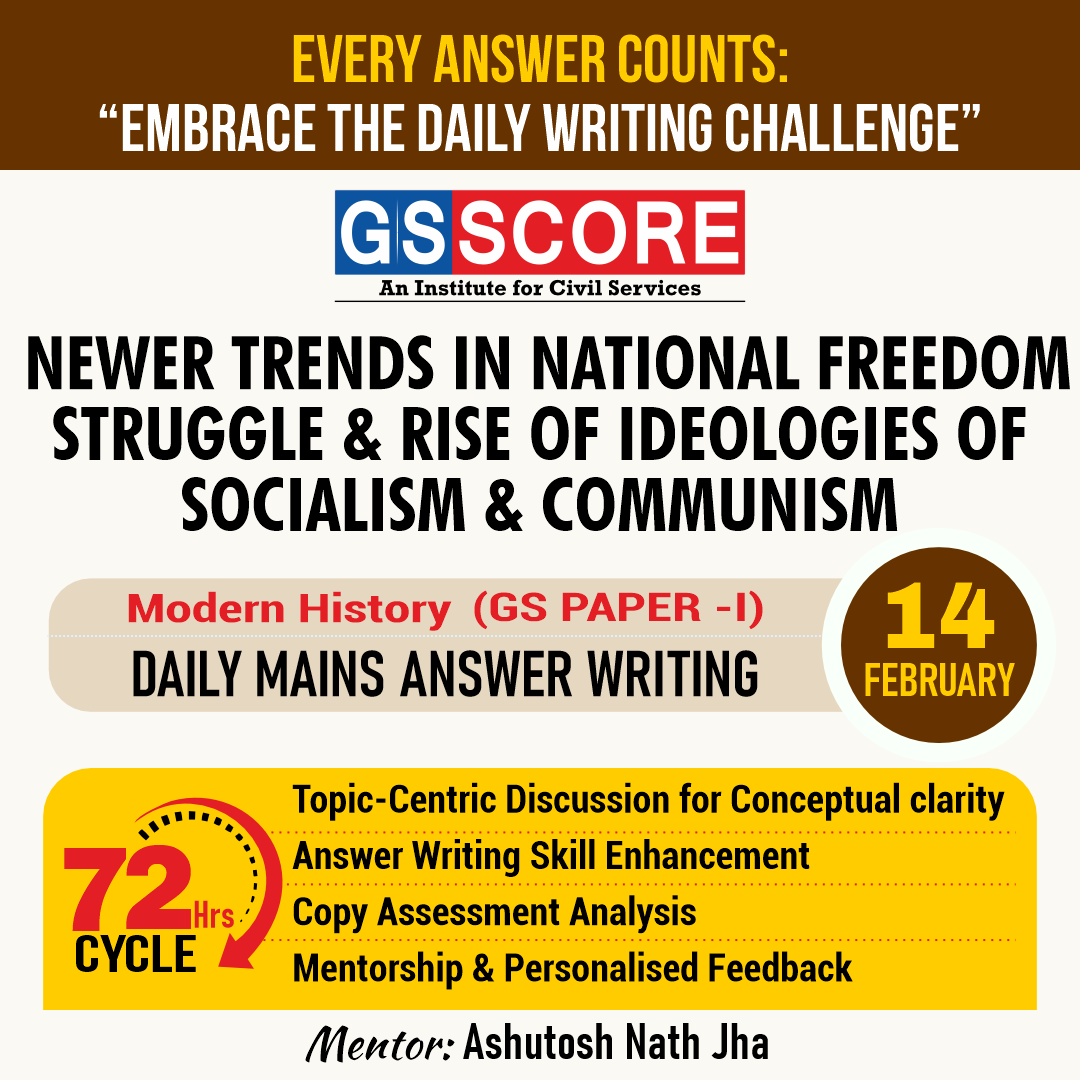

Modern History (Newer trends in National Freedom struggle and Rise of Ideologies of Socialism and Communism) by Ashutosh Nath Jha

Instruction:
- There will be 2 questions carrying the First Question is-10 marks Write your answers in 150 words and the Second Question is-15 marks Write your answers in 250 words.
- Any page left blank in the answer-book must be crossed out clearly.
- Evaluated Copy will be re-uploaded on the same thread after 2 days of uploading the copy.
- Discussion of the question and one to one answer improvement session of evaluated copies will be conducted through Google Meet with concerned faculty. You will be informed via mail or SMS for the discussion.
Question #1. Discuss the dynamic decades of 1920's in the national freedom movement. Evaluate it's transformative impact on the nature of Freedom movement. 10 marks (150 words)
Question #2. Discuss the evolution and impact of socialist and communist ideologies during the Indian freedom struggle. To what extent did socialist principles influence post-independence policies in India?" 15 marks (250 words)
(Examiner will pay special attention to the candidate's grasp of his/her material, its relevance to the subject chosen, and to his/ her ability to think constructively and to present his/her ideas concisely, logically and effectively).
STEPS & INSTRUCTIONS for uploading the answers
Step 1 - The Question for the day is provided below these instructions. It will be available at 7:00 AM.
Step 2 - Uploading of Answers : Write the answer in A4 Sheet leaving proper margins for comments and feedback and upload the PDF in MY ACCOUNT section. Click on the option of SUBMIT COPY to upload the PDF.
Step 3 - Deadline for Uploading Answers: The students shall upload their answers by 7:00 PM in the evening same day. The first 50 copies will be evaluated.
Step 4 - Feedback : Mentors will give their feedback for the answers uploaded. For more personalised feedback, join our telegram channel by clicking on the link https://t.me/mains_answer_writing_cse . A one-to-one session will be conducted with the faculty after copy evaluation in 72 Hrs.
Model Answer
Question #1. Discuss the dynamic decades of 1920's in the national freedom movement. Evaluate it's transformative impact on the nature of Freedom movement. 10 marks (150 words)
Hints
The 1920s marked a dynamic phase in the Indian national freedom movement, witnessing the influx of new ideological forces that significantly altered its nature. During this decade, revolutionary ideas gained momentum, complemented by the emergence of the Communist Party and socialist ideologies. The infusion of these thoughts added layers to the nationalist discourse, advocating for socio-economic reforms alongside political independence.
The role of women in the freedom movement also became more pronounced in the 1920s, as they actively participated in protests, marches, and campaigns. This marked a shift, expanding the movement's scope beyond conventional boundaries. Simultaneously, workers and trade unions started playing a crucial role, addressing labor issues and aligning with the larger cause of independence.
The Lahore Session of the Indian National Congress in 1929 was a turning point. The demand for complete independence or 'Purna Swaraj' became the central theme, showcasing the radical shift in the movement's objectives. Additionally, socialist undertones gained prominence, reflecting in the Karachi Session of 1931 and the Congress adopting a socialist pattern for the national flag.
The All India Trade Union Congress (AITUC), formed in 1920, marked the entry of organized labor into the national movement, emphasizing the intertwining of economic and political aspirations. However, the period also saw challenges like communalism, as differing political interests emerged, especially in the wake of the Minto-Morley Reforms and the subsequent Communal Award.
The 1920s transformed the nature of the Indian freedom movement by diversifying its base through the inclusion of revolutionary, socialist, and feminist elements. The Lahore and Karachi Sessions and the influence of AITUC highlighted the evolving dynamics, laying the groundwork for a more comprehensive struggle for independence.
Question #2. Discuss the evolution and impact of socialist and communist ideologies during the Indian freedom struggle. To what extent did socialist principles influence post-independence policies in India?" 15 marks (250 words)
Hints
During the Indian freedom struggle, socialist and communist ideologies played a significant role in shaping the socio-political landscape. Leaders such as Jayaprakash Narayan and Ram Manohar Lohia were proponents of socialist principles, advocating for economic equality and social justice. The Communist Party of India (CPI), led by figures like Bhagat Singh and M.N. Roy, added a distinct dimension to the struggle by challenging colonial rule and highlighting the exploitation of the working class.
The impact of these ideologies was evident in the demand for land reforms to address agrarian issues and reduce economic disparities. The socialist stance resonated with the marginalized sections of society, creating a broader alliance within the nationalist movement. The Communist influence, particularly during the Quit India Movement, demonstrated a commitment to challenging not only British imperialism but also socio-economic inequalities.
Post-independence, the echoes of socialist principles reverberated in the framing of the Constitution, incorporating Directive Principles emphasizing social justice and equitable distribution of resources. The planning process in the early years after independence reflected socialist ideals, with an emphasis on state-led economic development. The focus on public sector enterprises and land reforms aimed at realizing the socialist vision of a more egalitarian society.
The evolution and impact of socialist and communist ideologies during the Indian freedom struggle were instrumental in shaping the nation's commitment to social justice and economic equality. While their influence persisted in post-independence policies, India adopted a pragmatic approach, blending socialist ideals with elements of a market economy in its developmental journey.


